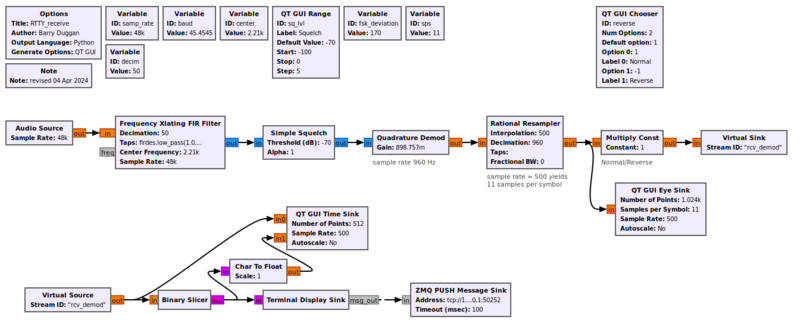Quadrature Demod: Difference between revisions
No edit summary |
No edit summary |
||
| Line 20: | Line 20: | ||
<math>y[n] = \mathrm{arg}\left(A e^{j2\pi\left( \frac f{f_s} n + \phi_0\right)} \overline{A e^{j2\pi( \frac f{f_s} (n-1) + \phi_0)}}\right)\ = \mathrm{arg}\left(A^2 e^{j2\pi\left( \frac f{f_s} n + \phi_0\right)} e^{-j2\pi( \frac f{f_s} (n-1) + \phi_0)}\right)\ = \mathrm{arg}\left( A^2 e^{j2\pi\left( \frac f{f_s} n + \phi_0 - \frac f{f_s} (n-1) - \phi_0\right)}\right)\ = \mathrm{arg}\left( A^2 e^{j2\pi\left( \frac f{f_s} n - \frac f{f_s} (n-1)\right)}\right)\ = \mathrm{arg}\left( A^2 e^{j2\pi\left( \frac f{f_s} \left(n-(n-1)\right)\right)}\right)\ = \mathrm{arg}\left( A^2 e^{j2\pi \frac f{f_s}}\right) </math> | <math>y[n] = \mathrm{arg}\left(A e^{j2\pi\left( \frac f{f_s} n + \phi_0\right)} \overline{A e^{j2\pi( \frac f{f_s} (n-1) + \phi_0)}}\right)\ = \mathrm{arg}\left(A^2 e^{j2\pi\left( \frac f{f_s} n + \phi_0\right)} e^{-j2\pi( \frac f{f_s} (n-1) + \phi_0)}\right)\ = \mathrm{arg}\left( A^2 e^{j2\pi\left( \frac f{f_s} n + \phi_0 - \frac f{f_s} (n-1) - \phi_0\right)}\right)\ = \mathrm{arg}\left( A^2 e^{j2\pi\left( \frac f{f_s} n - \frac f{f_s} (n-1)\right)}\right)\ = \mathrm{arg}\left( A^2 e^{j2\pi\left( \frac f{f_s} \left(n-(n-1)\right)\right)}\right)\ = \mathrm{arg}\left( A^2 e^{j2\pi \frac f{f_s}}\right) </math> | ||
<math>A</math> is real, so is | <math>A</math> is real, so is <math>A^2</math> and hence only scales, therefore <math>\mathrm{arg}(\cdot)</math> is invariant: <math>= \mathrm{arg}\left(e^{j2\pi \frac f{f_s}}\right)\= \frac f{f_s}\\ </math> | ||
== Parameters == | == Parameters == | ||
Revision as of 06:54, 4 December 2020
This can be used to demod FM, FSK, GMSK, etc. The input is complex baseband, output is the signal frequency in relation to the sample rate, multiplied with the gain.
Mathematically, this block calculates the product of the one-sample delayed input and the conjugate undelayed signal, and then calculates the argument of the resulting complex number:
Let x be a complex sinusoid with amplitude A>0, (absolute) frequency f\in\mathbb R and phase \phi_0\in[0;2\pi] sampled at f_s>0 so, without loss of generality,
then
is real, so is and hence only scales, therefore is invariant: Failed to parse (SVG (MathML can be enabled via browser plugin): Invalid response ("Math extension cannot connect to Restbase.") from server "https://en.wikipedia.org/api/rest_v1/":): {\displaystyle = \mathrm{arg}\left(e^{j2\pi \frac f{f_s}}\right)\= \frac f{f_s}\\ }
Parameters
- Gain
- Gain setting to adjust the output amplitude. Set based on converting the phase difference between samples to a nominal output value.
Example Flowgraph
This flowgraph shows the Quadrature Demod block as a Frequency Shift Keying detector.
Source Files
- C++ files
- [1]
- Header files
- [2]
- Public header files
- [3]
- Block definition
- [4]
![{\displaystyle y[n]=\mathrm {arg} \left(x[n]\,{\bar {x}}[n-1]\right)}](https://en.wikipedia.org/api/rest_v1/media/math/render/svg/84c630130d2bec382313f6da607e7df434cc7613)
![{\displaystyle x[n]=Ae^{j2\pi ({\frac {f}{f_{s}}}n+\phi _{0})}\ f}](https://en.wikipedia.org/api/rest_v1/media/math/render/svg/c7a69a54378a39cf1805ca54252709cb29b017ff)
![{\displaystyle y[n]=\mathrm {arg} \left(Ae^{j2\pi \left({\frac {f}{f_{s}}}n+\phi _{0}\right)}{\overline {Ae^{j2\pi ({\frac {f}{f_{s}}}(n-1)+\phi _{0})}}}\right)\ =\mathrm {arg} \left(A^{2}e^{j2\pi \left({\frac {f}{f_{s}}}n+\phi _{0}\right)}e^{-j2\pi ({\frac {f}{f_{s}}}(n-1)+\phi _{0})}\right)\ =\mathrm {arg} \left(A^{2}e^{j2\pi \left({\frac {f}{f_{s}}}n+\phi _{0}-{\frac {f}{f_{s}}}(n-1)-\phi _{0}\right)}\right)\ =\mathrm {arg} \left(A^{2}e^{j2\pi \left({\frac {f}{f_{s}}}n-{\frac {f}{f_{s}}}(n-1)\right)}\right)\ =\mathrm {arg} \left(A^{2}e^{j2\pi \left({\frac {f}{f_{s}}}\left(n-(n-1)\right)\right)}\right)\ =\mathrm {arg} \left(A^{2}e^{j2\pi {\frac {f}{f_{s}}}}\right)}](https://en.wikipedia.org/api/rest_v1/media/math/render/svg/cd12a233f670bb1276175b55b2fed0d7394085ba)



